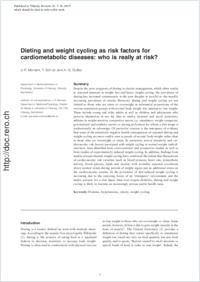Dieting and weight cycling as risk factors for cardiometabolic diseases: who is really at risk?
- Montani, Jean-Pierre Department of Medicine/Division of Physiology, University of Fribourg, Switzerland
- Schutz, Yves Department of Medicine/Division of Physiology, University of Fribourg, Switzerland
- Dulloo, Abdul G. Department of Medicine/Division of Physiology, University of Fribourg, Switzerland
-
01.02.2015
Published in:
- Obesity Reviews. - 2015, vol. 16, p. 7–18
English
Despite the poor prognosis of dieting in obesity management, which often results in repeated attempts at weight loss and hence weight cycling, the prevalence of dieting has increased continuously in the past decades in parallel to the steadily increasing prevalence of obesity. However, dieting and weight cycling are not limited to those who are obese or overweight as substantial proportions of the various population groups with normal body weight also attempt to lose weight. These include young and older adults as well as children and adolescents who perceive themselves as too fat (due to media, parental and social pressures), athletes in weight-sensitive competitive sports (i.e. mandatory weight categories, gravitational and aesthetic sports) or among performers for whom a slim image is professionally an advantage. Of particular concern is the emergence of evidence that some of the potentially negative health consequences of repeated dieting and weight cycling are more readily seen in people of normal body weight rather than in those who are overweight or obese. In particular, several metabolic and cardiovascular risk factors associated with weight cycling in normal-weight individuals have been identified from cross-sectional and prospective studies as well as from studies of experimentally induced weight cycling. In addition, findings from studies of experimental weight cycling have reinforced the notion that fluctuations of cardiovascular risk variables (such as blood pressure, heart rate, sympathetic activity, blood glucose, lipids and insulin) with probable repeated overshoots above normal values during periods of weight regain put an additional stress on the cardiovascular system. As the prevalence of diet-induced weight cycling is increasing due to the opposing forces of an ‘obesigenic’ environment and the media pressure for a slim figure (that even targets children), dieting and weight cycling is likely to become an increasingly serious public health issue.
- Faculty
- Faculté des sciences et de médecine
- Department
- Département de Médecine
- Language
-
- English
- Classification
- Medicine
- License
- License undefined
- Identifiers
-
- RERO DOC 235594
- DOI 10.1111/obr.12251
- Persistent URL
- https://folia.unifr.ch/unifr/documents/304227
Statistics
Document views: 127
File downloads:
- dull_dwc.pdf: 1188
